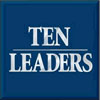For more than two decades Michael Leh of The Locks Law Firm has been one of the Philadelphia region's most accomplished and successful trial lawyers. Today he's the veteran of hundreds of personal-injury cases as well as complex class-actions, from pharmaceutical-liability claims to, more recently, litigation on behalf of retired NFL football players injured on the job. Moreover, he's the managing partner of the 23-lawyer Locks firm, which with offices in three states has long been one of the largest plaintiffs firms in the region. For all of that, Leh (pronounced "Lay") is hardly a showman or a glad-handing promoter; to the contrary, peers regard him as a low-key, practical lawyer with excellent business instincts- and still a grounded practitioner intensely proud of his working-class roots. In many respects Leh's pedigree - growing up in Pottstown PA, the son of a hard-working foundry foreman - has long been the original source of motivation, and inspiration, throughout his life and career. When he became a lawyer "I looked at my options and realized that I could only work for and represent working people" says Leh today. Securing "justice for the less powerful has always been what it's about." At Pottstown High School Leh played baseball and other sports, "competitive from the start" and keenly aware of "growing up on the wrong side of the tracks" in "a blue-collar town that felt 150 miles from the City, not 30." His father lost his job when the foundry closed, and he passed away in his early 50s, leaving the younger Leh to chart his course, well aware of society's often brutal indifference toward working people. Further, Leh says he developed a quiet determination, a response in part an early shyness that people sometimes mistook for unassertiveness. Attending Temple Leh worked numerous jobs to cover tuition; he contributed to The Temple News and considered a career in journalism, but "while I loved writing, field reporting wasn't for me." In the early 80s Leh tended bar at Bookbinder's on 15th Street, gaining insights on people, and deciding that "law school was the best way to live my own ideals." (A key early influence: The late judge Harry A. Takiff, one of Leh's instructors, who told him, "You'll never regret deciding to become a trial lawyer.") While in law school Leh clerked for the Locks firm, then only six lawyers; "I liked it right away, and I hoped they'd keep me on. I liked what the firm stood for." In the 70s and 80s, legendary trial lawyer Gene Locks was pioneering asbestos litigation, bringing suits on behalf of workers sickened in the region's shipyards.
Since then Leh has been central to the firm's huge growth and broadening practice, which has evolved into many types of personal-injury litigation, "a general mass tort firm" that includes complex class actions as well as medical malpractice and traditional personal injury. In 2003 Locks named Leh the firm's managing partner. The firm has since diversified further, in no small part for prudent business reasons; high-stakes cases require both excellent lawyering and business acumen. It's a key combination of skills in which Leh has proven himself. Still, Leh remains an active courtroom lawyer; over the years settlements and jury awards for Leh's clients have topped seven and eight figures, in many jurisdictions. (In 1988, he won for clients a verdict of $150 million, the largest in the United States that year.) Leh today oversees the firm's operations, but he credits his partners and associates for its recent successes, including benzene litigation and consumer class-actions under the Fair Labor Standards Act. Given his stature, Leh retains his self-effacing humility - hardly the stereotypical trial lawyer prone to high-volume excess. And he remains fiercely proud - of his profession, of his record and of his firm's day-to-day pursuit of justice and compensation for clients. "It's not difficult coming to work every day when you believe in what you do." Leh's first wife died of breast cancer when their children were 7 and 9 years old. A few years later he remarried; he and his wife, Gay, a psychotherapist, have five children as well as grandchildren. They live in nearby Cherry Hill, NJ, a short distance from the firm's New Jersey office and less than ten miles from its Center City office.

Fax: (215) 893-3444
Temple University, B.A., cum laude, 1979
Temple University School of Law, J.D., 1985



